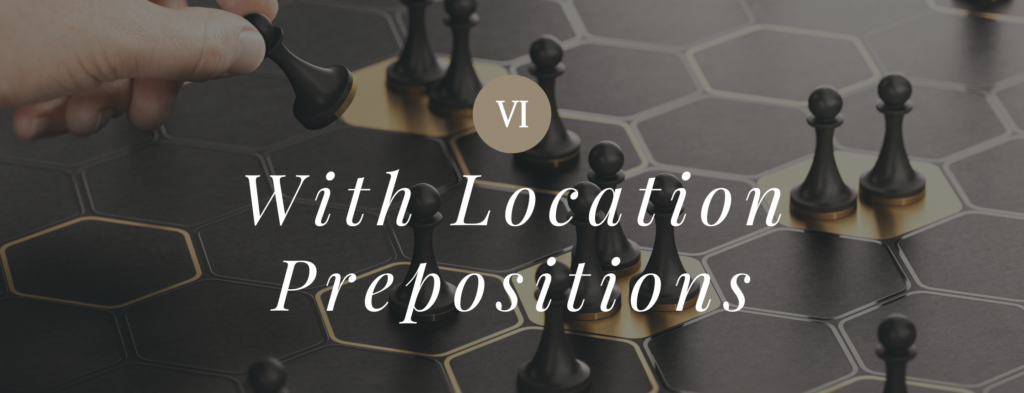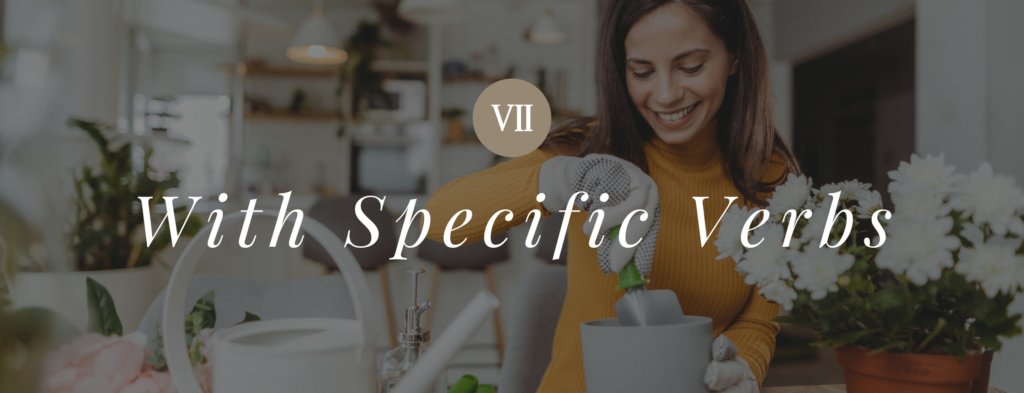

A Complete Guide to the Instrumental Case in Russian
Learn all about the instrumental case in Russian with this comprehensive study guide! If you’ve never heard of the instrumental case, first check out my guide on the Russian Case System to get the lay of the land. This guide serves as both an introduction and reference sheet to the instrumental case for beginners and advanced students.
Be sure to take the quiz at the end to check your understanding!
Before we look at all the instrumental case functions (when we use the instrumental case) and how to form the instrumental case, here is a basic example using the instrumental case:
Он стоя́л ря́дом с маши́ной. – He stood next to the car.
The word маши́на (car) above has been put into the instrumental case (маши́ной) because the preceding phrase “ря́дом с” dictates the instrumental cases’ usage. As such, the feminine noun маши́на — as indicated by the fact that it ends in an “а” in the nominative case — must be changed to маши́ной.
Last updated: 9/6/24
A note before we begin: This guide is a bit of a doozey in length – not because it is the most difficult, but because there are many verbs and prepositions in Russian that trigger the instrumental case which you often just need to memorize. That being said, many are similar enough in meaning, and are, therefore, often grouped together in textbooks/academic materials that teach the instrumental case. In this guide, I’ve grouped many of these verbs into categories based on meaning. These aren’t their official titles (because none officially exist) — they’re just meant to help you group them together in your mind to help you better remember which verbs use the instrumental case.
Давайте начнём!
Contents
The Instrumental Case in Russian

How to Form the Instrumental Case in Russian
Adjective and Noun Endings
| Gender | Singular | Plural | ||||
|---|---|---|---|---|---|---|
| Adj. | Noun | Adj. | Noun | |||
| Masculine | ым / им | cons. → ом/ем* й → ем ь → ем/ём† |
ex. брат → братом ex. муж → мужем ex. музей → музеем ex. парень → паренем ex. словарь → словарём |
ыми / ими | cons. → ами й → ями ь → ями |
ex. дом → домами ex. герой → героями ex. день → днями |
| Feminine | ой / ей | а → ой/ей* я → ей/ёй† ь → ью |
ex. книга → книгой ex. груша → грушей ex. неделя → неделей ex. семья → семьёй ex. жизнь → жизнью |
ыми / ими | а → ами я → ями ь → ями |
ex. ручка → ручками ex. статья → статьями ex. дверь → дверями |
| Neuter |
ым / им | о → ом е → ем мя → енем |
ex. озеро → озером ex. море → морем ex. время → временем |
ыми / ими | о → ами е → ями мя → енами |
ex. письмо → письмами ex. окно → окнами ex. имя → именами |
| * Ending unstressed AND preceded by шипящий (ж, ш, ч, щ, ц) → ем † Ending stressed |
||||||
| Exceptions: мать (матери) → матерью (матерьми) дочь (дочери) → дочерью (дочерьми) ребёнок (дети) → ребёнком (детьми) человек (люди) → человеком (людьми) брат (братья) → братом (братьями) друг (друзья) → другом (друзьями) |
||||||
Personal Pronouns
| Nominative | Instrumental |
|---|---|
| я | мной |
| ты | тобой |
| он | им / ним |
| она | ей / ней |
| мы | нами |
| вы | вами |
| они | ими / ними |
Possessive Pronouns
| Masculine, Neuter Singular | Feminine Singular | Plural |
|---|---|---|
| мой, моё → моим | моя → моей | мои → моими |
| твой, твоё → твоим | твоя → твоей | твои → твоими |
| свой, своё → своим | своя → своей | свои → своими |
| наш, наше → нашем | наша → нашей | наши → нашими |
| ваш, ваше → вашем | ваша → вашей | ваши → вашими |
| её, его, их do not change | ||

When to Use the Instrumental Case in Russian

1. To Indicate the “Do-er” or Instrument/Means by Which Something is Done
Кем? – By whom? Who?
- Пиши́те ру́чкой, а не карандашо́м. – Write with pen, not pencil.
- Я поре́зал себе́ па́лец ножо́м. – I cut my finger with a knife.
- Она помаха́ла мне руко́й на проща́ние. – She waved goodbye to me.
Чем? – By means of what?
- Пиши́те ру́чкой, а не карандашо́м. – Write with pen, not pencil.
- Я поре́зал себе́ па́лец ножо́м. – I cut my finger with a knife.
- Она помаха́ла мне руко́й на проща́ние. – She waved goodbye to me.
Common Verbs

2. To Indicate How Something is Done
С чем? – With what? How?
- Мари́я с интере́сом слу́шала. – Maria listened interest.
- Я бы с ра́достью помо́гла тебе, только я сейчас очень занята́. – I’d be happy to help you, but I’m really busy right now.
Как? (+ чем) – How?
- Ты почему шёпотом говори́шь? – Why are are whispering?
- Мой оте́ц всегда говори́т очень гро́мким го́лосом. – My father always speaks with a loud voice.
- Как нау́чится пла́вать бра́ссом? – How can you learn to do (swim) breaststroke?
- Рома́н зака́нчивается сме́ртью гла́вного геро́я. – The novel ends with the death of the main character.
- Он чита́л кни́гу вверх нога́ми. – He was reading the book upside down.
- Он прибу́дет по́ездом в 9:10. – He’ll arrive by train at 9:10.
💡 How can you tell when to use “+с чем?” and when to just use “чем?”?
Ask yourself this question: Does the expression make sense without a modifier (an accompanying adjective, participle, or pronoun)? If it does make sense, then the preposition “с” is used. If it doesn’t, then the preposition “с” is not used.
Ex.
смотреть с волнением (to watch with excitement) — no modifier + makes sense
смотреть с большим волнением’ (to watch with great excitement) — modifier + makes sense
= We use “с”
Ex.
Говорить слабым голосом’ (to speak in a faint voice) — doesn’t make sense without a modifier (it would be redundant – how else would you speak if not with your voice?)
= We don’t use “с”

3. To Express Time
Когда? – When?
- Она просну́лась ра́нним утром. – She woke up early in the morning.
- Ты ве́чером свобо́ден? – Are you free in the evening?
- Он це́лыми дня́ми играет в видеоигры. – He plays video games all day.
Перед чем? – (Right) Before when?
- Он пришёл пе́ред уро́ком. – He arrived before class.

4. To Make Comparisons
To make comparisons in Russian, you can either use the genitive case after comparative words (e.g. Соба́ки мне нра́вятся больше кошек.) or by adding the instrumental “чем,” meaning “than,” after comparative words (e.g. Соба́ки мне нра́вятся больше, чем кошки). See more examples below.
Больше чем что/кто? – More than what/who?
- Она говори́т по-неме́цки лу́чше, чем я. – She speaks German better than me.
- Я чу́вствую себя сего́дня ху́же, чем вчера́. – I feel worse today than I did yesterday.
Чем больше . . ., тем больше . . . – The more . . . the more. . .
- Чем больше я размышля́л над пробле́мой, тем сложнее она каза́лась. – The more I thought about the problem, the more difficult it seemed.
- Чем дольше мы жда́ли, тем нетерпели́вее мы станови́лись. – The longer we waited, the more impatient we became.

5. With Preposition “С” – “With”
We use the instrumental case after the preposition “с” meaning “with.” However, it should be noted that the Russian preposition “с” does not exclusively trigger the instrumental case – “с” can mean both “with” (triggering the instrumental case), but also “from” (triggering the genitive case). Look to the verb being used for context clues in order to use the applicable case.
Below you’ll find a) examples and b) a list of common verbs and phrases that use the preposition “с” + the instrumental case.
С чем? – With what?
- Я пью чай с са́харом. – I drink tea with sugar.
- Со́ня – краси́вая де́вушка со све́тлыми волоса́ми и голубы́ми глаза́ми. – Sonia is a pretty girl with light hair and blue eyes.
С кем? – With whom?
- Мы с ним обы́чно говори́м друг с дру́гом по-ру́сски. – Me and him usually speak Russian with each other.
- Она с Анной ходи́ли в кино́. – She went to the movies with Anna.
Common Verbs and Phrases – Preposition “С” + Instrumental Case
- встреча́ться / встре́титься (+с чем/кем?)
- знако́миться / познако́миться (+с кем?) – to meet, get to know
- дружи́ть (+с кем?) – to be friends with
- ла́дить / пола́дить (+с кем?) – to get along with
- ви́деться / уви́деться (+с кем?) – to see someone
- обща́ться / пообща́ться (+с кем?) – to communicate, chat with
- соглаша́ться / согласи́ться (+с кем?) – to agree with
- поздравля́ть / поздра́вить (+с чем-либо) – to congratulate with
- обраща́ться / обрати́ться (+с кем/чем?) – to treat, behave, handle
- справля́ться / спра́виться (+с чем?) – to manage, deal with, cope with
- проща́ться / попроща́ться (+с кем?) – to say goodbye
- ссо́риться / поссо́риться (+с кем?) – to argue, quarrel with
- спо́рить / поспо́рить (+с кем?) – to argue with
- мири́ться / помири́ться (+с кем?) – to make peace with, reconcile, make up with
- сража́ться / срази́ться (+с кем/чем?) – to fight, battle
- дра́ться / подра́ться (+с кем?) – to fight (physical)
- воева́ть / повоева́ть (+с кем?) – to be at war with
- (Кому-либо) повезло́ / везёт / повезёт (+с чем/кем?) – to be/get lucky (past, present, future)
- свя́зано (+с чем/кем?)
- по сравне́нию (+с чем/кем?)

6. With Location Prepositions – рядом с, над, под, между, за, перед
On their own, the prepositions “рядом с,” “над,” “под,” “между,” “за,” and “перед,” + the instrumental case describe location/position.
ря́дом с(о) – next to
над – over, above
под – under, below
ме́жду – between
за – behind
пе́ред – in front of, right before
Note: The instrumental case is only triggered with the prepositions above if the subject/object in question is not changing locations. If something/someone is moving/being moved to or from a location (e.g. using a verb of motion or verb of placement), you must use the accusative case after the above prepositions. It is the same consideration that must be given when deciding to use the accusative vs. prepositional case regarding location.
Common Verbs and Phrases – Prepositions над, под, за, перед + Instrumental Case
Над
- смея́ться / посмея́ться (+над чем/кем?) – to laugh at, make fun of
- работать (+над чем?) – to work on some project
- смея́ться / посмея́ться (+над чем/кем?) – to laugh at, make fun of
- прика́лываться / приколо́ться (+над чем/кем?) – to kid, pull someone’s leg, joke about
- насмеха́ться (+над чем/кем?) – to mock, make fun of
- издева́ться / поиздева́ться (+над чем/кем?) – to mess with, bully, make fun of
- размышля́ть / размы́слить (+над чем?) – to think about, reflect on, ponder
- пла́кать / попла́кать (+над чем/кем?) – to cry over
Под
- лежа́ть / полежа́ть (+под чем/кем?) – to lie under
- подпи́сываться / подписа́ться (+под чем?) – to sign under
- под наблюде́нием – under surveillance
- под дождём – under/in the rain
- под угро́зой – under threat
За
- заходи́ть / зайти́ (+за чем/кем?) – to go and get something/someone
- ходи́ть / сходи́ть(+за чем/кем?) – to go and get, go out for something/someone
- сиде́ть (+за чем/кем?) – to sit at/behind
- уха́живать (+за чем/кем?) – to take care of, look after
- следи́ть (+за чем/кем?) – to follow, watch
- сле́довать / после́довать (+за чем/кем?) – to follow
- за рулём – behind the wheel
- за́мужем за кем-либо – married to someone
Пе́ред
- (Кто-то) винова́т (+пе́ред кем?) – to be guilty before
- выступа́ть / вы́ступить (+пе́ред чем/кем?) – to perform, speak in front of
- извиня́ться / извини́ться (+пе́ред кем?) – to apologize to
- отчи́тываться / отчита́ться (+пе́ред кем?) – to report to
- унижа́ться / уни́зиться (+пе́ред кем?) – to humiliate oneself in front of, grovel
- опра́вдываться / оправда́ться (+пе́ред кем?) – to justify oneself to, give someone an explanation

7. With Specific Verbs
Many verbs in Russian trigger the use of the instrumental case – I’ve categorized some of them by meaning below.
States of Being and Existence
- явля́ться – to be (formal)
- станови́ться / стать – to become
- быть – to be
- каза́ться / показа́ться – to seem
- ока́зываться / оказа́ться – to turn out
- счита́ться – to be considered
- называ́ться / назва́ться – to be called
Leadership, Authority, and Service
- рабо́тать – to work
- служи́ть / послужи́ть – to serve
- кома́ндовать – to command, give orders to
- управля́ть – to manage, control, govern
- руководи́ть – to lead, be in charge of
- владе́ть – to have command of; to own
- облада́ть – to possess
Interest and Engagement
- занима́ться / заня́ться – to be engaged in
- интересова́ться / заинтересова́ться – to be interested in
- увлека́ться / увле́чься – to be interested in, to be passionate about
- наслажда́ться / наслади́ться – to enjoy
- любова́ться / полюбова́ться – to admire, delight in
- восторга́ться – to admire, rave
- восхища́ться / восхити́ться – to admire, marvel at
Pride, Fame, and Recognition
- горди́ться / возгорди́ться – to be proud of, take pride in
- хва́статься / похва́статься – to show off, brag
- изве́стен – famous
- сла́виться / просла́виться – to be renowned, to become famous
- бога́т – rich
- знамени́т – famous, notable
- отме́чен – marked, noted
Emotional Reactions and Enjoyment
- интересова́ться / заинтересова́ться – to be interested in
- увлека́ться / увле́чься – to be interested in, to be passionate about
- наслажда́ться / наслади́ться – to enjoy
- любова́ться / полюбова́ться – to admire, delight in
- восторга́ться – to admire, rave
- восхища́ться / восхити́ться – to admire, marvel at
Risk, Sacrifice, and Value
- рискова́ть / рискну́ть – to risk
- же́ртвовать / поже́ртвовать – to donate, sacrifice
- злоупотребля́ть / злоупотреби́ть – to abuse
- дорожи́ть – to cherish, treasure

Let’s practice!

Questions?
Comment below any questions you have or write your own examples using the instrumental case! If you need some more help, check out the videos below for more explanations and examples.
Learn to speak russian
Travel with ease & dive into the culture, history & lifestyle of post-Soviet countries
free russian learning materials
Melissa
Get the Goods
Head over to the Language & Travel Shop to check out my favorite goodies I use for learning Russian and traveling! I've compiled all my favorite products I use when #onthebloc so that you can benefit from them when you travel abroad. Help yourself prepare and support this blog at the same time :) Счастливого пути!
carry-on goods
gifts for travelers
photography
apparel & accessories
textbooks & readers
luggage & bags
categories
#oTB essentials
Russian-Speaking Travel Destinations
use your new russian skills in real life!
Belarus
EASTERN EUROPE
central Asia
central Asia
Eurasia
Russia
Kyrgyzstan
armenia
Moldova
Kazakhstan
eastern europe
read »
read »
read »
read »
read »
read »
The caucasus